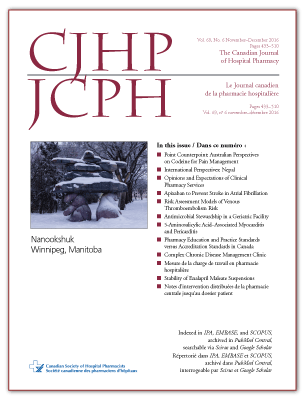Impact of Antimicrobial Stewardship on Physician Practice in a Geriatric Facility
DOI:
https://doi.org/10.4212/cjhp.v69i6.1609Keywords:
antibiotics, long-term care, urinary tract infection, practice modification, antimicrobial stewardship, antibiotiques, soins de longue durée, infection urinaire, changement dans la pratique, gérance des antimicrobiensAbstract
ABSTRACT
Background: There is a paucity of literature describing the implementation of antimicrobial stewardship programs (ASPs) in long-term care (LTC) facilities. The current study evaluated the impact of an ASP that was implemented across a geriatric facility, which included an inpatient specialty hospital and an LTC facility. The program included prospective audits with feedback, multidisciplinary education, information technology interventions, and guideline development.
Objective: To investigate the impact of the ASP on physicians’ prescribing practices in this geriatric facility.
Methods: Utilization data for antibiotics commonly used to treat urinary tract infections were retrieved for the period September 1, 2011, to August 31, 2013. The study examined whether there were significant changes in overall antibiotic use, ciprofloxacin use, and physician prescribing behaviour after program implementation in September 2012.
Results: There was no significant change in the total number of antibiotic prescriptions for urinary tract infections in the hospital or the LTC facility after ASP implementation. Significant reductions were seen in the average days of therapy initially prescribed and the actual days of therapy after ASP implementation in the LTC facility but not the hospital. Across both facilities, significant reductions were seen in the number of ciprofloxacin prescriptions.
Conclusions: The current study showed that an ASP can affect physicians’ antibiotic prescribing behaviour and antibiotic usage in an LTC environment.
RÉSUMÉ
Contexte : Il n’existe que très peu de documentation qui porte sur la mise en oeuvre de programmes de gérance des antimicrobiens dans les établissements de soins de longue durée. La présente étude a évalué l’effet d’un programme de gérance des antimicrobiens mis en oeuvre dans l’ensemble d’un centre gériatrique, qui comprenait un hôpital spécialisé et un établissement de soins de longue durée. Le programme comprenait des audits prospectifs accompagnés de rétroaction, des séances de formation multidisciplinaire, des interventions s’appuyant sur les technologies de l’information et l’élaboration de lignes directrices.
Objectif : Évaluer les effets du programme de gérance des antimicrobiens sur les habitudes de prescription des médecins travaillant dans ce centre gériatrique.
Méthodes : L’étude s’appuie sur les données d’utilisation des antibiotiques les plus employés pour traiter les infections urinaires recueillies entre le 1er septembre 2011 et le 31 août 2013. L’étude a examiné si des changements significatifs à l’utilisation des antimicrobiens et de la ciprofloxacine ainsi qu’aux habitudes de prescription des médecins ont résulté de la mise en oeuvre du programme en septembre 2012.
Résultats : Aucun changement significatif n’a été noté dans le nombre total de prescriptions d’antibiotiques destinés à traiter les infections urinaires à l’hôpital et dans l’établissement de soins de longue durée. D’importantes réductions ont été observées dans la moyenne des jours de traitement initialement prescrits et le nombre réel de jours de traitement après la mise en oeuvre du programme à l’établissement de soins de longue durée, mais pas à l’hôpital. Aux deux établissements, des réductions significatives du nombre de prescriptions de ciprofloxacine ont été observées.
Conclusions : La présente étude a montré qu’un programme de gérance des antimicrobiens peut avoir un effet sur les habitudes de prescription d’antibiotiques des médecins et sur l’utilisation des antibiotiques dans un établissement de soins de longue durée.
Downloads
Published
Issue
Section
License
Copyright © Canadian Society of Healthcare-Systems Pharmacy.
After publication of a manuscript in the CJHP, the authors of the manuscript must obtain written permission from the CSHP (publications@cshp.ca) before reproducing any text, figures, tables, or illustrations from the work in future works of their own. If a submitted manuscript is declined for publication in the CJHP, all said rights shall revert to the authors. Please note that any forms (e.g., preprinted orders and patient intake forms) used by a specific hospital or other health care facility and included as illustrative material with a manuscript are exempt from this copyright transfer. The CJHP will require a letter from the hospital or health care facility granting permission to publish the document(s).










